Opinion
As we continue the wait for 5G services

By Sonny Aragba-Akpore
Nikolai Gogol’s “The Inspector General “ told a story many years ago that resonates today.
Apart from painting a picture of mockery in his satirical rendition, it tells us about the frailty of humanity and its foibles despite the pretences.
Ben Jonson,s “ Volpone” brings the story home and giggles at its consequences as capsulated by the hunchback displaying greed and pretentious lifestyle in society.
But more instructive is Gogol,s “The Inspector General “ which depicts deception in its entirety.
In 1978,Nigerian playwright, a very big example of his generation, Femi Osofisan, published
“Who is Afraid of Solarin” adapted from Gogol’s “The Inspector General “ and brought the story home painting a lurid picture of the deception that goes on in government.
Osofisan never envisaged our present state of affairs but his picture of the future was clear for all to see as we experience today.
But was he a visionary, who could predict the things to come. Perhaps so.
Solarin as a public complaints commissioner in the old western state was revered by all and his name struck awe in society as he had his eyes on integrity and so like Gogol’s character, Solarin was a change agent.
But Ofcourse many people used his name, dropped it in order to create awe on society, hoodwink the people and make them accept “defeat as fate” to quote Osofisan.
What has happened to integrity in public service and how do we situate this in telecommunications services especially with regards to poor quality of service, drop calls and data fleecing yet no one seems to care and questions not being asked and no answers in that regard.
If we have managed to live with the drudgery of poor services, how do we begin the story of fifth generation (5G) telecommunications services which allegedly entered Nigeria nearly three years ago without drawing inference from the pieces of literature highlighted above?
The materials talk about life and everyday living. So are telecommunications services because they are integral parts of everyday living and when government decided to introduce 5G into the country,those familiar with its workings saw it as promises of life abundance.
It’s nearly 30 months since its launch but the noise and euphoria that welcomed it have died down, and the people have little or nothing to show for it except government which was the biggest beneficiary having collected $273.6m each from the three licenced operators and while we await the services ,the government, indeed everyone looks elsewhere for the much hyped 5G to take proper root.
If anything at all, there are pockets of services so far, offered by the three supposed operators for the services: MTN Nigeria, Mafab Communications and Airtel Nigeria but as things stand today, it appears 5G was mere noise and hype as Nigerians await in their various corners for the much talked about 5G services that Karl Toriola, MTN Chief said will be a game changer.
Strangely too,no one is asking questions as to the existence or not of the 5G services.
Have subscribers become so complacent that they have accepted defeat as fate in the face of corporate docility?
Even the once vibrant pressure groups-Association of Telecommunications Companies of Nigeria (ATCON),Association of Licenced Telecommunications Companies of Nigeria ( ALTON) among others have lost their voices.
Are we now confined to accepting anything simply because we are afraid to face the consequences therefrom if we shout?
Everyone yearns for heaven but afraid of dying. But like Osofisan said somewhere, ”is this death so horrible that we all must compromise with injustice in order to live?”. The future is our judge.
While we agree that providing services is purely a business decision but are business people not in business in their own interests and that of society?
And no one is talking about the services yet nobody is worried or are they experiencing subdued worries until the services come or have they completely given up on the expectation of the services?
On June 19, 2023, the last of the three to acquire the 5G licence, Airtel, kicked off its fifth generation network rollout in four locations, Lagos, Ogun, Rivers and Abuja, and the firm, is targeting coverage of the entire country by the end of the current financial year.
Unsuspecting Nigerians who joined in the excitement of the alleged entry of 5G services are now unsure of their expectations.
Licences were awarded on December 21, 2021 to MTN Nigeria and a little known Mafab Communications. They had a roll out timeline of August 2022 but the regulator granted an extension of five months to Mafab Communications to get ready. Thus the regulator changed the rules in between the game thus sending the first signal that all was not well. There have been several red flags.
MTN tried to weather the storm despite the challenges (even when it will not admit it openly) and “launched” a semblance of 5G services in parts of Nigeria. But that is where the excitement stops. Airtel, a late arrival shows some promises as we wait.
And so, the hype built around 5G has left everyone including the operators and regulators speechless as there is very little tangible evidence of availability of services so far. We have now accepted our fate as the wait goes on.
Nigerian Communications Commission (NCC) data show that 5G subscriptions in the country increased to 2.3 million in December 2023.
This, however, represents an insignificant 1.04% of the country’s total active subscriptions for telephone services, which stood at 224.7 million at the end of 2023.
International Telecommunications Union (ITU) Mobile Network Coverage facts and figures 2023 says “Since commercial deployment began in 2019, 5G coverage has increased to reach 40 per cent of the world population in 2023.
Distribution, however, remains very uneven. While 89 per cent of the population in high-income countries is covered by a 5G network, coverage remains limited in low-income countries. Europe boasts the most extensive 5G coverage, with 68 per cent of the population covered, followed by the Americas region (59 per cent) and the Asia-Pacific region (42 per cent). Coverage reaches 12 per cent of the population in the Arab States region and less than 10 per cent in the CIS region (8 per cent) and Africa region (6 per cent).
Ninety per cent of the world population is covered by 4G, and where 5G is not available, this remains a very good alternative. However, 55 per cent of people without access to 4G live in low-income countries. Whereas 95 per cent of the population in high-income and middle-income countries is covered by 4G or above, the proportion drops to 39 per cent in low-income countries, where 3G remains the dominant technology, and often the only technology available to connect to the Internet.”
The overall pace of 5G growth in the country remains sluggish, underscoring the complexities associated with transitioning to next-generation networks.
However, the data showed that 2G subscriptions continued to dominate, representing 57.78 per cent of connections in January 2024.
The ITU recently revealed that Africa maintained the lowest 5G coverage rate globally, standing at only 6 per cent as of December 2023.
It attributed the low 5G coverage rate on the continent to the ongoing significance of older mobile technologies, particularly 2G and 3G networks.
The ITU report highlighted the persistent reliance on 2G and 3G networks in many African countries, including Nigeria, where those technologies offer a cost-effective means of delivering essential mobile services, especially in regions lacking access to 4G and 5G networks.
In 2022, around one tenth of all connections worldwide used 5G technology, with this share set to surpass one half by the end of the decade. However, regional disparity is expected to persist, with the availability of 5G infrastructure, high costs imposed by network operators, and the availability of 5G handsets continuing to impact consumer uptake.
The North America, Developed Asia Pacific, and Gulf Cooperation Council (GCC) regions are set to have surpassed 90 percent adoption by 2030, while adoption in Sub-Saharan Africa is projected to remain below 20 percent.
However, it has been suggested that 5G could play a key role in bridging the digital divide in the form of fixed wireless access (FWA).
5G FWA services use 5G networks to deliver high speed broadband internet in regions without fixed broadband infrastructure. As of 2023, almost a third of service providers in the Middle East and Africa offered a 5G FWA service.
The Global System Mobile Association (GSMA) says by 2025, 5G networks are likely to cover one-third of the world’s population. The impact on the mobile industry and its customers will be profound.
5G is more than a new generation of technologies; it denotes a new era in which connectivity will become increasingly fluid and flexible.
5G Networks will adapt to applications and performance will be tailored precisely to the needs of the user.
Working closely with the mobile operators pioneering 5G, the GSMA is engaging with governments, vertical industries including automotive, financial services, healthcare providers, transport operators, utilities and other industry sectors to develop business cases for 5G.
5G remains an exciting new technology that consumers and service providers are bracing up for.
5G statistics reveal projected volume growth for 5G smartphones as well as for revenue for 5G chipsets. Leading original equipment manufacturers are also beefing up 5G patents in a bid to be first in the 5G wars.
There are currently hundreds of millions of 5G global subscriptions. Subscriptions are forecast to reach three billion by 2025. (5G Americas and Omdia, 2021)
As of April 2021, there were 683 total 5G and Long Term Evolution (LTE) deployments made worldwide. (5G Americas and Omdia, 2021)
There are currently 135 5G networks around the world that comply with 3rd Generation Partnership Project (3GPP) standards. (5G Americas, 2020)
5G smartphone shipments comprised 40% of global volume by 2021. This is expected to grow to 69% in 2025. (IDC, 2021)
In 2021, there were 89.5 million 5G smartphone units shipped to the United States. 5G smartphone shipments will reach 153.3 million units in 2025, at a CAGR of 35.6%.
Consumer electronics and automotive applications are forecast to both have a 21.7% share of the 5G infrastructure by 2025. Meanwhile, industrial apps will have a 20.1% share while energy and utilities will have a 15.7% share. (Statista, 2020)
The 5G chipset market reached $3.55 billion in 2021 and $22.86 billion by 2027, at a CAGR of 41%. (Statista, The Insight Partners)
Samsung has a 74% market share of the 5G smartphone market in the US. This is followed by LG at 15% and OnePlus at 11%.
Huawei has a 15.39% share of 5G families with patents. Huawei is followed by Qualcomm (11.24%), ZTE (9.81%), and Samsung (6.7%).
Data presented by Bankr indicates that the 5G technology global coverage will grow by 253.84% in the next five years. By 2025, about 53% of the global population at 4.14 billion will have access to the technology.
Few regions are driving 5G technology uptake
In 2021, the network coverage reached an estimated 1.95 billion people representing about 25% of the global population. In the last two years, the network access progressed to 32% of the global population at 2.5 billion.
In 2023, 5G network reached about 39% of the global population at 3.05 billion people. By 2024, an estimated 46% of the global population at 3.6 billion will be using the network.
According to the research report: “The over one billion access to 5G coverage in 2020 is a culmination of a joint clear consensus on the 5G network by major players in recent years. The coverage is significant however, it is being driven by a select few regions in Asia, the US, and Europe.
Other regions are still building the infrastructure to accommodate the technology. Notably, Asia is a current leader in 5G after undergoing a rapid migration in mobile broadband networks and smartphones setting the perfect ground for 5G adoption.”
Opinion
INSPIRING TAKEWAYS AT TUNDE OLUSUNLE’S DIAMOND SOIREE
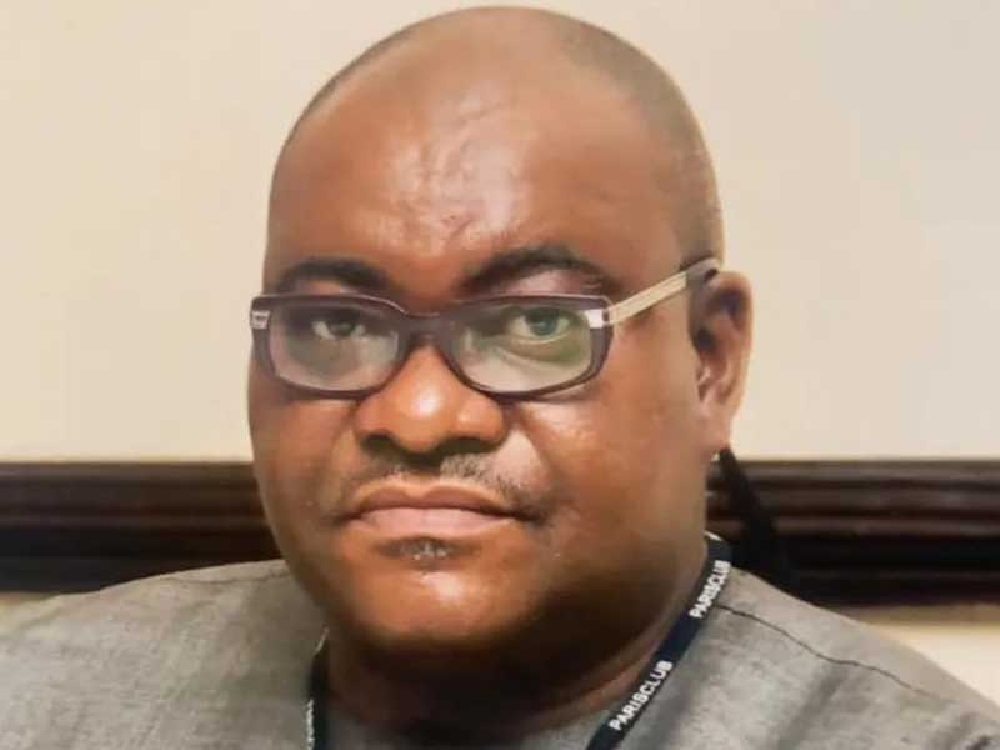
BY BOLAJI AFOLABI
Oftentimes, it’s always challenging to organize commemorative parties for those who have distinctions in this pastime. Dr. Tunde Olusunle, Adjunct Professor of Creative Writing at the University of Abuja; recently re-named Yakubu Gowon University is one of the few masters in the game. Over the last two decades of close relationship with him, he has played massive roles in organizing parties for people. Call him a highly-rated events planner, you may not be wrong. He is not the usual, typical party planner around who has taken up the vocation as business. Olusunle does this for people dear to him; friends, bosses, colleagues, associations, communities, and more pro bono. At any of these occasions, he throws everything towards making the event successful. He invests his time, intellect, organisational savvy, and personal resources; months, weeks, and days to make the event grandiose. Some of his close friends eulogized his dexterity, expertise, and capacities in single-handedly coordinating parties, events, and other celebrations.
The writer, cognisant that Olusunle will mark his birthday in the month of March, was somewhat worried. Why? This year’s birthday was different, as the multi-tasking professional will climb “six stairs” and join the unique club of 60. So, who will coordinate a befitting birthday shindig for the “master organizer?” Can such match the quality of similar others that Babaeto; one of his titles, and moniker loosely translated as “Chief Organizer” has arranged for people? How can the standard set by him be met, if not surpassed? Still pondering, a thought came to mind. Given the national economic crisis that has led to accentuating poverty, staggering hyperinflation, disabling unemployment, corrosive hunger, and more, Olusunle; who is ever conscious of situations around him, may spring surprises. He may opt for simpler and modest celebrations.
About two weeks to d-day, an e-invite forwarded to the writer confirmed one’s thought. The card was beautiful in colours; aesthetic in design; and unique in words. Having close similarities with Babaeto’s imprimatur, it read, “please join us for drinks, bites, and laughter as we commemorate the Diamond Birthday of our father, husband, brother, and good friend; Tunde Olusunle ……” Further checks confirmed that the event was packaged by Dr. Funmi Olusunle, with Aramide, Yomi, and Tobi; wife and children of Babaeto was to be a modest gathering of people. On this, the “plotters” scored a bull’s eye. Surely, Olusunle will be excited that his ever-loving, dependable, and reliable better-half of over three decades, and scions are gradually “edging him out” in the plotting, planning, and execution of numerous surprise parties for people.
The weather on Sunday, March 30 was clement and friendly, away from the scorching sun of the previous day. This was the first surprise while heading to the event. Driving through the Gaduwa-Lokongoma axis of the capital city, the writer had another round of pleasant surprises. Making a detour, vehicular movements to the Estate gate; which was over 400 meters away, gave an idea of what to expect. After “snaking and snailing” through the entrance, which was about 100 meters to the residence, it became clear, and evident that this may not be a small event, as originally planned. The writer, struggling for a comfortable parking space, recalled what Pastor Tumo Ojelabi; a retired Director, Federal Ministry of Information earlier said, “Oga is a friend to all. It is almost impossible to have a small party to mark his 60th birthday. Many people will attend the event, either invited or not.”
Scheduled to officially commence by 5 pm, the programme was up and running an hour before. Given the elaborate preparations for any eventualities, the early arrivers were treated to a collage of bites, drinks, and soul-lifting songs. In between, there were memorable photo sessions on the lush green carpet emblazoned with Olusunle’s very visible portrait properly affixed. As the day progressed, more people made their ways to the beautifully decorated outer foyer of the celebrant’s residence. Hearty exchange of pleasantries, excited high-fives, warm embraces, friendly hugs, and more swept the entire atmosphere. The lively gathering was an admixture of grandparents, fathers, and mothers. Not forgetting the youths, and children. Typical of Olusunle’s enviable virtues of accessibility, humility, humanity, and inclusivity, guests and attendees cuts across different strata of the society.
With Yomi standing-in for the day’s master of ceremonies, (MC), the programme commenced a few minutes past five in the evening. Pastor Omotoba of the Redeemed Christian Church of God, (RCCG) offered the opening prayers, which was brief and impactful. Yomi, as the fill-in compere did a good job, as she was able to galvanize the audience with few jokes, gesticulations, and puzzles. Perhaps sensing the bulk of the happy guests were in their 40s to 60s, she requested for the rendition of early-school rhymes in the 1970s to late 1980s. Masterstroke! Led by a few ladies, the entire place came alive as it brought back nostalgic memories. Thereafter, the MC took over. Aramide delivered a “love letter” that was full of emotions, inspiration, and gratitude. Tobi, the “baby” of the house, who is a strong supporter of English Premier League’s Manchester United was working behind the scenes to ensure the overall success of the birthday bash.
Virtually all those called to describe Olusunle in one word, used the opportunity to heap praises, prayers, and commendations on him. Dr. Tivlumun Nyitse, Associate Professor of Mass Communications at Bingham University, Abuja, confirmed that, “we have been friends for over 40 years. Over the years and decades, the relationship has grown from family to brothers. As I wish him a happy diamond birthday, I advise him to slow down.” Dr. Femi Ajisafe, an agriculture entrepreneur affirmed that, “we both joined, and started work as secondary school teachers somewhere way-off modernity in a rustic, and sleepy community in Kogi state over three decades ago. Happily, we have been together; and our respective families ever since.”
Saluting Olusunle’s resilience, Dr. John Olarewaju, former Director-General, Michael Imodu Institute of Labour and Development Studies, (MIILDS) revealed, “he is ever dogged, determined, and sacrificial. So committed and consistent with writing that he can do it anywhere.” For Dr. Clem Baiye, former Managing Director, Daily Times PLC, “Olusunle is a go-getter.” An obviously joyous and excited Madam Elizabeth Olusunle, Mother of the celebrant expressed appreciation to family members and friends, particularly Dr. Funmi Olusunle for her steadfast love, and consistent understanding of everyone. Mama, also prayed for her dear son. The session ended with an inspiring Yoruba rendition by Anuoluwapo Favour Fabiyi; a hugely gifted and brilliant teenager.
As the evening progressed, it was clear that the planned simple hoedown turned to a classy, high-energy reception laced with flair and flash. Evidently wrapped in panache, pomp, and pageantry. From meals to drinks, jokes, and more, the get-together had trappings of charm, elegance, and sophistication. The dazzles and allure literally arrested everyone all through. It was exciting, entertaining, and memorable. Filled with thrills, frills, grills, and much more. The night was filled with revealing stories and engaging reminiscences that will be inspiring takeaways for many people. The excellent dishing and mixing of “old school” songs got many; including the writer either humming the lyrics, shaking heads, moving bodies or hitting the dance floor.
Indeed, the quality and quantity of guests who came to honour Olusunle; at short notice was a worthy testament of the recognition and acceptability of the celebrant as a “peoples man.” The roll call of personalities was large. Chief Onyema Ugochukwu, pioneer Chairman, Niger Delta Development Commission, (NDDC), and his lovely wife, Dr. Joyce Ugochukwu; AIG Tony Olofu, (Rtd), and wife, DIG Rhoda Olofu; Hon. Leke Abejide, Member representing Yagba Federal Constituency, and his wife were there. Dr. Boboye Oyeyemi, former Corps Marshall, Federal Roads Safety Corps, (FRSC); Pastor Tunde Ipinmisho, former General Manager, Public Affairs, Federal Housing Authority, (FHA); Prof. Sunnie Ododo, former Chief Executive Officer, National Theatre. Dr. Emmanuel Ikpeme, Deputy Secretary-General, Nigerian Football Federation, (NFF); Chief Femi Melefa, consultant and entrepreneur; Pastor Yomi Babaniyi, and wife, and many others graced the occasion. Not forgetting Hon. TeeJay Yusuf, and Deputy Corps Marshall Clement Oladele, who were out of the country and Abuja respectively, but extended their congratulatory messages to Olusunle.
As the elegant soiree spread late night guests had more to savour. Properly garnished, sumptuous delicacies, refrigerated drinks, and eye-popping small chops flowed endlessly. Undoubtedly, the knees-up; according to the British were exhilarating and enthralling. For many, the event, turned out to be a worthy, timely rendezvous of sorts. There was a reunion of old friends; re-kindling of friendships; and building of new networks. Many agreed that it will be an unforgettable experience.
* BOLAJI AFOLABI, a Development Communications specialist was with the Office of Public Affairs, The Presidency, Abuja.
Opinion
CELEBRATING A PRODIGIOUS WORDSMITH: TUNDE OLUSUNLE @ SIXTY
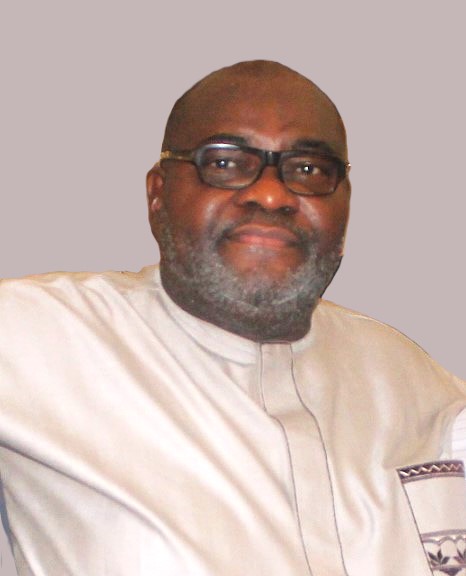
BY BOLAJI AFOLABI
Poring over countless title-ideas for this article, the above emerged from the blues. Further checks about the subject confirmed the title as fit and proper. Describing Tunde Olusunle as a “prodigious wordsmith” is no exaggeration. In every of his work, he comes across as one who has vocabulary virtuosity, and endowed with narrative mastery. He displays unimaginable linguistic dexterity which is intertwined with rhetorical flair, and imbued with creative vision. He carves the right words, and descriptive styles to paint beautiful scenery of complex and cumbersome situations. He crafts, engages, and suspends readers till the last words are happily soaked in. So, the title is both deliberate and intentional.
Dr. Tunde Olusunle, an Adjunct Professor of Creative Writing at the University of Abuja; which was recently re-named Yakubu Gowon University, is a man of many parts. He is a celebrated journalist; author; poet; communicator; and public speaker. Thus, he fits into all the fields where intellect, elucidation, and erudition coalesce. As a Columnist and Editor, he rose to the top of Journalism. In Literature, aside from having degrees, he has many published (and yet to be published) poems. He has written, co-written, edited, and co-edited over a dozen books; earning the Fellowship of the Association of Nigerian Authors, (FANA). In the last few years in academia, he is making exceptional accomplishments as a scholar, teacher, and researcher nurturing and mentoring a new generation of creative writers.
Sometime in the ’90s; during the Late General Sani Abacha regime, the writer went to the Saka Tinubu, Victoria Island, Lagos office of an elder brother; Ade-Ralph Olamife. After late lunch at the classy canteen within the precincts of the Nigeria Telecommunications Limited, (NITEL) offices, the host extended an invitation. He said, “I want you to join me later today to meet a friend coming from Ikeja.” About 7 pm, we (Olamife, two other friends, and the writer) drove into Bishop Oluwole Street in Victoria Island, Lagos. The building was the Kogi state Liaison Office at that time. Surprisingly, the august friend, who came with another person was already seated. After the exchange of pleasantries, the subject of this article was introduced by Olamife. Olusunle, who came with Alhaji Hakeem Bello; later Media Adviser to Babatunde Raji Fashola, (SAN), interacted freely with everyone. During the over two hours sit-out, Olusunle came across as a witty, lively, intelligent, and brilliant personality.
After this first meeting, the writer; through Olamife had subsequent interactions with Olusunle in Ikeja, Maryland, Ikoyi, and Victoria Island areas of Lagos. On every occasion, he exudes confidence and accessibility just as his humble and humane attributes come alive. After over a year of gap, largely due to the analogue communication state, and his relocation out of Lagos, Olamife broke the cheering news of Olusunle’s appointment as the Chief Press Secretary to the Kogi state Military Administrator; Col. Paul Omeruo. A few months later, the writer accompanied (as usual) Olamife; to visit Omeruo in Lokoja. By the way, both Olusunle and Olamife are mutual friends to the Administrator, fondly referred to as PUNO; initials of his names. During the two-week visit, Olusunle was the perfect host; he made every evening eventful and memorable. From discussions, many civil servants spoke glowingly about him. In and around the Lugard House; Administrator’s residence and office, as well as Ministries, Departments, and Agencies, (MDAs), his interpersonal relationships were eulogized. Succinctly, he could be described as a people’s man.
With the birth of democracy in May 1999, and the inauguration of Chief Olusegun Obasanjo as the President and Commander in Chief of Nigeria, the writer partially relocated to Abuja, hoping to explore opportunities in the new government. Watching the Nigerian Television Authority’s flagship news, the advert inviting people to the official launch of the new administration’s “Campaign for National Rebirth” sounded interesting. The writer made his way to the purposely-built Eagle Square venue of the event. As the programme progressed, the presence and importance of Olusunle was very evident. Events over, the writer swiftly moved from the stands down the platform to offer salutations to him. Pushed, shoved aside by over-zealous security operatives, it was a herculean task. At the point of giving up, an incident happened which diverted the attention of almost everyone. Leveraging on this, the writer made his way to the dais. Standing before Olusunle, he called the writer’s name, hugged, and exchanged pleasantries. Quickly, he said, “I’ll be out of Abuja for one week, meet me at Sheraton Hotels next week please.”
The writer’s visit to Sheraton Hotels marked the beginning of a relationship that has grown in leaps and bounds. Either at the Hotel’s Papillon Restaurant or the Poolside Bar, and Nicon Noga (now Transcorp) Hilton Hotel, the compassionate, empathetic, and accommodating attributes of Olusunle always come to the fore. They were unmistakable and unequivocal. During one of the numerous visits, he requested for the writer’s curriculum vitae; without saying what he wanted to do with it? It was discovered, early that he loves working behind the scenes. Beneficiaries of his advocacy, and benevolence only get to know when “food don done for eating.” One recalls on a visit to his 7th floor, Sheraton Hotels “temporary official residence” he beckoned on the writer to accompany him to somewhere. In a few minutes, we were in one of the suites at the Hilton Hotel, only to see Chief Onyema Ugochukwu, emeritus journalist, and public administrator walked in. With shock, suspense, and excitement written on one’s face, Olusunle introduced the writer saying, “Oga, this is one of our younger but silent supporters.”
A few months later, the import of that visit came to light. Through the persistent advocacy, and resilient prodding of Ugochukwu and Olusunle, President Obasanjo gave approval for major recruitments to strengthen the rebirth campaign, and public affairs management of the new government. So, the writer and other people benefitted from a forward-thinking proposal that was primarily targeted at media professionals who were part of the Obasanjo presidential campaign organization. Pastor Tumo Ojelabi, a retired Federal Director who was one of the beneficiaries declared that, “Oga, is a fastidious personality, a determined helper who can be positively stubborn, and dogged when pursuing a course that he has strong conviction about.” Continuing, Ojelabi, who was the official Photographer to Obasanjo during the presidential campaign said, “but for his resilience, courage, and never-quiver spirit; and Oga Ugochukwu, many of us who toiled during the campaigns would have been left dry.” For Mr. Taiwo Akinyemi, who was Obasanjo’s campaign Official Videographer, “Olusunle is a fighter; a dynamic fighter for other people. When he realized that politicians who did not contribute much to Baba’s electoral success were getting their loyalists into the new government, he fought relentlessly for us all. God used him to get me employed in the federal civil service, I remain eternally grateful.”
Olusunle is a pan-Nigerian, totally detribalized, and not given to ethnicity, religious segregation and similar stereotype. Described by close friends as diligent, dedicated, and devoted to friendship, Olusunle remains a restless and tireless quester for knowledge and new challenges. Given his multi-dimensional, and multi-tasking skills and proficiencies, he can excel in whatever profession, assignment, and position. Energized by his voracious search for new ideas, he is almost, always thinking out of the box. Very ingenious, creative, and imaginative, one recalls few initiatives that came from his fertile mind during the Obasanjo presidency. Persistent encouraging words about Nigeria’s sports which led to the inclusion of the “sports brief” to his schedules. Advocacy for the hosting of the Commonwealth Heads of Government Meeting, (CHOGM) at any of the nation’s resorts; which informed him leading a team of journalists, tourism experts, and bureaucrats to the Yankari Games Reserves in Bauchi. What about the National Media Tour, though initiated by him but hijacked by a few top government officials who at the end muddled the entire programme?
Corroborating, Mr. Vincent Oyefeso, a retired Federal Director, and another beneficiary of the Obasanjo appointments approval, said, “he is an illustrious Nigerian and a patriot per excellence, who bestrides many walks of life as an intellectual collossus, a humanist of no mean hue, and an advocate of the finest social ethos. At the realms of public communications, the academia, and public service, he exudes the best practices worthy of emulation by right-thinking compatriots.” For Mr. Ukadike Uwabor, a media communications consultant, “since I’ve known him, he has remained consistent with the core values of excellence, versatility, and intellect. He relates perfectly with different people no matter the age, religion, tribe, or social status. Little wonder his friends cut across different strata of the society. That the people of Umukabia autonomous community in Abia state conferred on him a chieftaincy title; which is outside his geographical, ethnic, and linguistic zone speaks volumes about his personality.” Olusunle by the way, has few other titles bestowed on him in different parts of the country.
Agreed, no human being is perfect but the writer has personal experiences about Olusunle that remains nostalgic. Indeed, the over two decades relationships have grown from one stage to the other. From boss to teacher, mentor, and motivator. He has played (and continues to play) different roles in one’s professional development, and career progression. Perhaps, he may not realize this; while working with him, Olusunle doesn’t attend meetings alone. The writer, Late Alhaji Wasiu Anjous, and (on few occasions) Akinyemi accompanied him to any meeting, particularly with MDAs. Another striking feature was that he introduced you as a “colleague.” With that, one’s stock, respect, and recognition increases. One of the fall-out of such remarkable style happened at the 2004 Olympics Games in Greece, when Late Mr. Solomon Matankari, Nigeria’s Chef de Mission, and Sports Ministry’s Permanent Secretary insisted on the participation of Anjous and the writer in high-level meetings.
Not persuaded by the hierarchical structure of the civil service, Olusunle places premium on availability, delivery, and consistency. Just a few months after being deployed to his office, the writer had a baptism of fire. Barely 48 hours after one of the regular presidential chats, Olusunle passed the recorded tape, and declared, “do transcribe and deliver in three days.” Sensing shock, and surprise, he encouraged, “you can do it, go at your pace.” On another occasion, a few days after commending the writer on a piece, “From Saw Dust To The Skies,” he said, “write a speech for Dr. Mrs. Kema Chikwe, the Aviation Minister, for a programme this Saturday to be held in Garki, Abuja.” Though tough but exciting, it marked my entry into the exclusive class of speech writers; till this moment. Sometime in 2023; after long hiatus from opinion writing, due to a new assignment at the National Assembly, the writer did a piece. Impressed, Olusunle called immediately, “BJ, I’ve just read your brilliant article. I encourage you to make this more regular, please. I’m available to offer any support where and when necessary.” Truly, he has kept faith to his promise in the over thirty articles written between December 2023 and now.
This is the man we are celebrating today, and always. Olusunle is an extremely organized personality, whose writings and interventions are laced with irrefutable data, educative instances, and inspiring suggestions. When occasions demands, you can’t help but applaud his depth of knowledge, information reservoir, deep vistas, and un-ending capacity. Oyefeso prays that, “the Lord grants him peace as he steps into the sixth floor. The Father of Lights will continually uphold and uplift him from Glory to Glory in Jesus Name.” Mr. Jacob Zwings, aide to Director-General, National Orientation Agency added that, “Oga Tunde, in his own way has impacted positively on the lives of people. On the occasion of his Diamond jubilee, I pray that God will perfect everything that concerns him and his family.” Akinyemi declared that, “just as he has been a blessing to other people’s children, God will bless him, his wife, and children.” Uwabor believes that, “Enyi Oha has become a reference point to many people. The good Lord will grant him more years in good health as he age gracefully with abundance of all-round blessings.” Ojelabi affirmed that, “Olusunle is who he is today; an accomplished man who stands tall among his peers because of his commitment towards extending helping hands to those who needs it.”
* BOLAJI AFOLABI, a Development Communications specialist was with the Office of Public Affairs, The Presidency, Abuja.
Opinion
PROFESSOR HUMPHREY NWOSU: THE UNSUNG HERO OF TRUE NIGERIAN DEMOCRACY
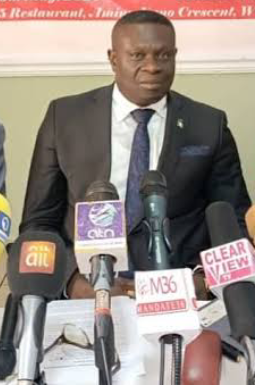
Written by Dr. Nwambu Gabriel,Director General, Centre for Credible Leadership and Citizens Awareness
Introduction
The journey to democratic governance in Nigeria has been fraught with challenges, conflicts, and untold sacrifices. Among the gallant figures who stood resilient in the face of adversity was Professor Humphrey Nwosu. As we mourn the loss of a remarkable leader and an indomitable champion of democracy, we reflect on his contributions and unwavering commitment to the electoral process, which laid a foundational path for Nigeria’s democratic practice.
A Visionary Electoral Leader
Professor Nwosu’s tenure as Chairman of Nigeria’s National Electoral Commission (NEC) from 1989 to 1993 marked a pivotal era in the nation’s electoral history. Unlike many of his contemporaries, Nwosu approached his responsibilities with an unwavering resolve to uphold the sanctity of the electoral process. He successfully organized several elections, including Local Government Chairmanship, Governorship, and State and National Assembly elections, which were lauded for their transparency and fairness. His most significant achievement came with the conduct of the June 12, 1993, presidential elections, widely regarded as one of the freest and fairest elections in Nigeria’s history.
Courageous Stand Against Adversity
In an environment characterized by military interference and political manipulation, Nwosu exemplified courage. He boldly overturned a court order issued on June 10, 1993, that sought to halt the presidential elections. Despite facing intense pressure from the military establishment led by Ibrahim Babangida (IBB), he remained resolute, emphasizing his commitment to ensuring that the elections were conducted as planned. His insistence on completing his mandate, even when his commission was dissolved midway through the electoral process, is a testament to his integrity and dedication.
His unyielding stance culminated in the announcement of results from 29 out of 30 states in the June 12 elections. Although General Ibrahim Babangida annulled the elections before Nwosu could declare the final results, his steadfastness demonstrated his belief in the democratic process and the necessity of honoring the voice of the Nigerian electorate.
Championing Democracy Through Documentation
Professor Nwosu did not allow the annulment of the June 12 elections to silence his voice. In his book, *Laying the Foundation of Nigeria’s Democracy: My Account of June 12, 1993 Presidential Election and Its Annulment*, he chronicled the events leading to the election and its aftermath. By publishing the results of the June 12 elections, he presented irrefutable evidence of MKO Abiola’s victory, reinforcing the notion that the people’s will should prevail over political machinations. This documentation serves as a historical account of a significant moment in Nigeria’s struggle for democracy and a rallying cry for future generations.
Legacy of Integrity
As we reflect on Professor Nwosu’s life and contributions, it is essential to recognize his legacy of integrity, bravery, and unwavering commitment to democratic principles. He stood as a beacon of hope during a tumultuous period in Nigerian history, proving that one individual’s resolute stand could indeed lead to monumental change. His story serves as an inspiration to current and future leaders to prioritize the will of the people over personal or political gain.
Conclusion
The passing of Professor Humphrey Nwosu is not just a loss to his family and friends but to a nation that desperately needs champions of democracy. His actions during the critical moments of June 12, 1993, solidified his place in history as a true man of democracy. As we commemorate his life, we are reminded that democracy thrives through the courage and integrity of individuals like Professor Nwosu—those who are willing to stand firm against oppression and ensure that the voice of the people is heard.
May his soul rest in peace, and may his legacy continue to inspire generations to uphold the values of democracy, transparency, and justice in Nigeria.
-
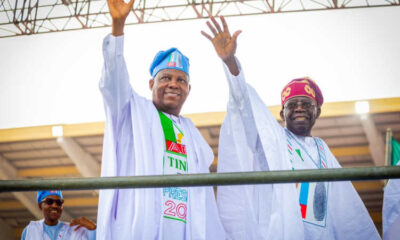
 Politics7 hours ago
Politics7 hours agoTinubu Gives Fani Kayode, Others New Appointments (See Full List)
-

 News7 hours ago
News7 hours agoDANGER! Ex-Soldier Abubakar Affan Vows to Kill VeryDarkMan ‘Like Deborah Samuel’
-
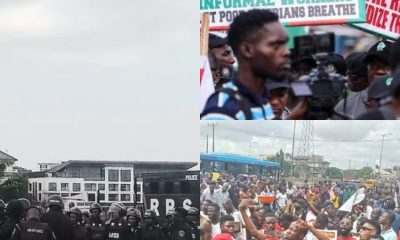
 News23 hours ago
News23 hours agoSecurity Alert: Police alert officers ahead of nationwide protest over living costs, free speech
-

 News11 hours ago
News11 hours agoWhy NYSC maybe extended by FG- Minister
-
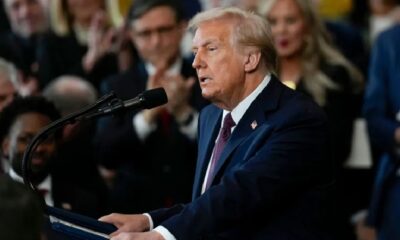
 News21 hours ago
News21 hours agoVOA Halts Operations In Nigeria, Others Over President Trump
-

 News10 hours ago
News10 hours agoIbas moves to rehabilitate damaged Rivers LG secretariats
-
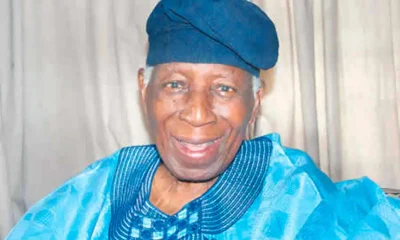
 News8 hours ago
News8 hours agoJust in: Ex-Oyo governor, Olunloyo is dead
-

 Economy11 hours ago
Economy11 hours agoCBN allocates $197.71m into FX market to support naira






